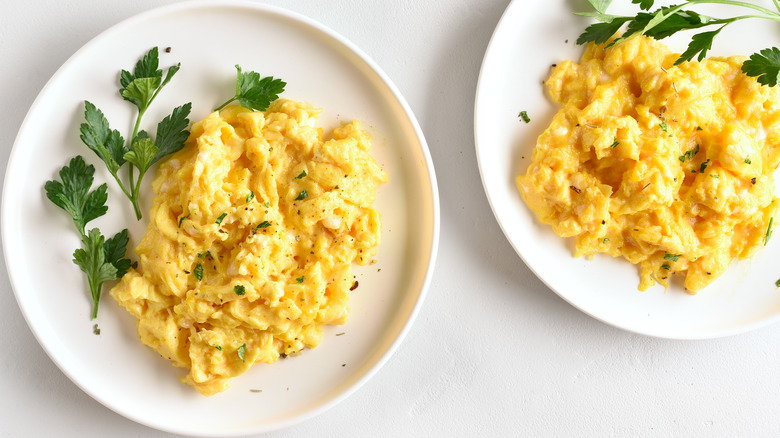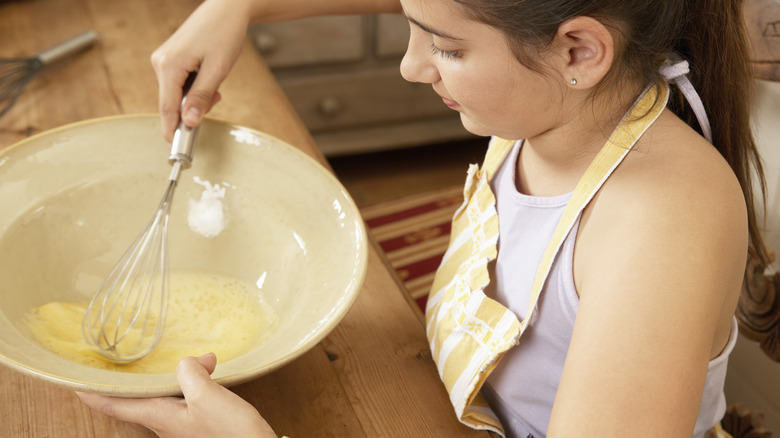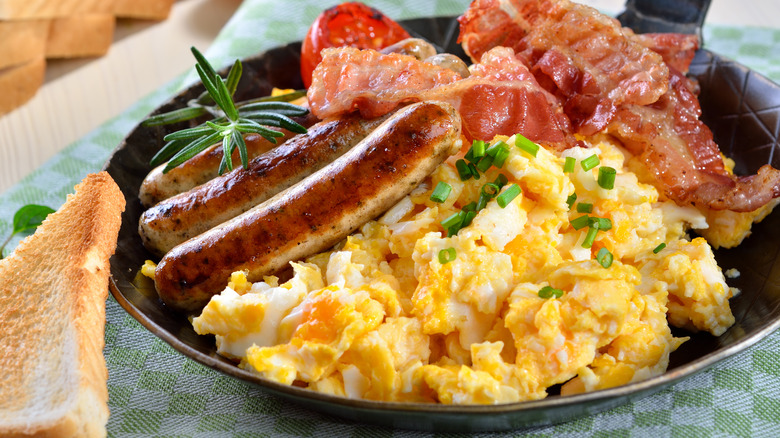Jamie Oliver's Simple Tip For Perfectly Cooked Scrambled Eggs
Eggs, for all their single-ingredient simplicity, are deceptively difficult to master in the kitchen. There are so many things that can go wrong when you make eggs: from cracking them incorrectly to putting them in a too-cold pan, to overcooking them, to winding up with that nearly impossible-to-scrub-off egg crust at the bottom of your skillet. Seriously, what culinary alchemy turns that stuff stone? Hunker tells us to tackle it with salt and vinegar.
Scrambled eggs might seem more user-friendly at first, since you beat the yolk and white together into a homogenous mixture. But cooking them perfectly can be as tough as nailing yolky sunny-side-up eggs. Of course, the doneness of scrambled eggs is somewhat dictated by personal preference – some people prefer "wet" eggs, for example – but we can agree that fluffy eggs are better than rubbery ones. Fortunately, celebrity chef Jamie Oliver has our backs, delivering (over) easy advice to up your scrambled egg game.
Stop cooking your eggs before they're done
It might sound counterintuitive, but on his website, Jamie Oliver says you must remove your eggs from heat just before they appear fully cooked. You can either turn off the burner or nudge them off it, but either way, you need to keep in mind that eggs will continue to bask in the residual warmth, Chef Oliver explains. Letting them simmer away until they are actually done is too much.
Perfect scrambled eggs also depend on your diligence before cooking. The Food We Know cautions cooks not to prepare their eggs the night before, as the air introduced by beating them won't stick around. So beat your eggs thoroughly in a bowl for best results, right before you put them into a hot pan, and if you're going to throw a liquid in there, make sure it's whole milk (or something even fattier, such as cream) and NOT water, says The Food We Know. Food Network (via Alton Brown) says you want to see some foam, but you don't want to over-beat your eggs, either. Celebrate the interplay between the egg's protein and water molecules, as explained by Exploratorium. Lastly, salt your eggs after cooking or you'll alter the texture and cancel out all your hard work.
Ways to enjoy scrambled eggs
Now that you know the secret behind a dreamy plate of golden, bouncy scrambled eggs, it's time to show them off. Serving them with bacon, sausage, toast, and home fries is just fine, but why not turn them into tacos? There's also the traditional Turkish dish menemen, and fried rice to come to the rescue when your rice cooker was a little too generous. There's an ongoing debate about whether or not ketchup goes on eggs (via The Takeout), but if it's not your thing you can try them with goat cheese, pesto, salsa, or even jam, per Insider.
Scrambled eggs are totally worth all this fuss, by the way. The Food We Know states that ancient Iranians ate egg yolk cooked with spices and milk, and Reference reports that ancient Romans were likely the first to make scrambled eggs. This simple but tricky preparation has endured through the centuries, but fortunately – thanks to Chef Oliver – it won't take you that long to master it.


